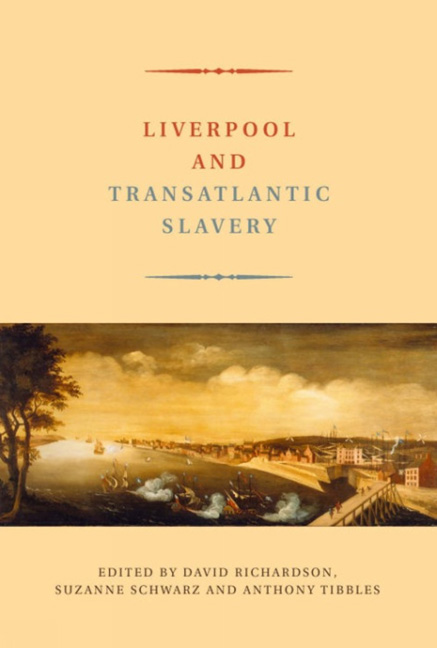Book contents
- Frontmatter
- Content
- Preface
- Notes on Contributors
- Introduction Liverpool, the African Slave Trade and Abolition Thirty Years On
- 1 Liverpool's Dominance in the British Slave Trade, 1740–1807
- 2 African Agency and the Liverpool Slave Trade
- 3 Human Capital in the British Slave Trade
- 4 Liverpool's Slave Trade to the Colonial Chesapeake: Slaving on the Periphery
- 5 The Liverpool Slave Trade, Lancaster and its Environs
- 6 The Atlantic Slave Trade and African Ethnicities in Seventeenth-Century Jamaica
- 7 The Wealth and Social Aspirations of Liverpool's Slave Merchants of the Second Half of the Eighteenth Century
- 8 ‘Cemented by the Blood of a Negro’? The Impact of the Slave Trade on Eighteenth-Century Liverpool
- 9 Commerce, Civilization and Christianity: The Development of the Sierra Leone Company
- 10 Abolitionism in Liverpool
- Index
3 - Human Capital in the British Slave Trade
- Frontmatter
- Content
- Preface
- Notes on Contributors
- Introduction Liverpool, the African Slave Trade and Abolition Thirty Years On
- 1 Liverpool's Dominance in the British Slave Trade, 1740–1807
- 2 African Agency and the Liverpool Slave Trade
- 3 Human Capital in the British Slave Trade
- 4 Liverpool's Slave Trade to the Colonial Chesapeake: Slaving on the Periphery
- 5 The Liverpool Slave Trade, Lancaster and its Environs
- 6 The Atlantic Slave Trade and African Ethnicities in Seventeenth-Century Jamaica
- 7 The Wealth and Social Aspirations of Liverpool's Slave Merchants of the Second Half of the Eighteenth Century
- 8 ‘Cemented by the Blood of a Negro’? The Impact of the Slave Trade on Eighteenth-Century Liverpool
- 9 Commerce, Civilization and Christianity: The Development of the Sierra Leone Company
- 10 Abolitionism in Liverpool
- Index
Summary
In January 1799 Jamaican sugar tycoon Simon Taylor planned to organize a slaving enterprise with his merchant–cousin Robert Taylor of London and merchant Thomas Hughan of Liverpool. Fearful of the abolition of the British slave trade, led by that ‘imp of Hull Wilberforce’, Taylor speculated that his enterprise could yield great profits, as apprehensive merchant–planters would bid up the price of slaves. He also wanted to ensure that a sufficient number of enslaved African workers would arrive at his Jamaican plantations and those of his acquaintances. Taylor decided therefore to help finance four slaving voyages, two to Anomabu on the Gold Coast and two to Bonny in the Bight of Biafra. Rather than fit out all four voyages from Britain's premier port, London, Taylor opted instead to organize the two Bonny ventures from Liverpool. Taylor's rationale: ‘I do conceive in general that the Bonny ships can be better fitted out [in Liverpool] than in London and good captains, mates and surgeons be procured there’.
Simon Taylor's decision to base his Bonny slavers in Liverpool, not London, points to two commercial advantages enjoyed by Liverpool merchants trading to the Bight of Biafra: a ready supply of goods assorted specifically for the Bonny market; and the availability of skilled slaving officers required to transact trade directly with African businessmen. Historians have noted how Liverpool dealers benefited from close access to key Lancashire/Midland textile and metal manufactures, products critical in all African Atlantic markets. Yet no study assesses whether Liverpool maintained a comparative advantage in shipboard personnel or analyses manpower requirements by regional African market. As Taylor understood, a Liverpool ship's husband had less difficulty mustering experienced captains, mates and surgeons to Bonny than would an agent in London.
Merchants could therefore plan ventures to depart at set dates, knowing that after they loaded assortments of trading goods, they could assemble key officers and requisite numbers of crewmen.
Human capital, defined here as waged shipboard personnel rather than valuable enslaved Africans, played a pivotal role in Liverpool's rise and later dominance in the British slave trade. The availability of well–trained Guinea mariners during most months of the year enabled Merseyside merchants to turn vessels around quickly in port, so that captains could trade during African slave, produce and provisions seasons.
- Type
- Chapter
- Information
- Liverpool and Transatlantic Slavery , pp. 66 - 97Publisher: Liverpool University PressPrint publication year: 2007



